I run the annual State of JavaScript developer survey, and I was thrilled to see survey respondents more than double this year from 16,085 in 2021 to 39,471 in 2022.
Yet despite that big increase one thing that remains constant is that only 7% of respondents identify as women, non-binary, or gender-non-conforming.
A consequence of such a skewed ratio is that the opinion of people who identify as men risks drowning out all other voices. So to combat this, I've been focusing on creating new filtering tools to make these voices louder.
Today, I want to show you how I used these tools to dig deeper into the survey's data, and then broadened my research by asking other communities, platforms, and content creators about their own audience demographics.
Two Important Notes About Gender
This post will focus on men vs women, and I am well aware that reducing gender to a dichotomy is both factually inaccurate, and also very unfair to the many people who don't fit into said dichotomy.
Sadly, when it comes to non-binary or gender non-conforming audiences the State of JS survey doesn't provide us with a lot of data. For that reason, I have decided to focus primarily on women as a first step.
Additionally, I know that the vocabulary around gender is often the subject of contention and debate. So if I happen to mis-use a term while discussing these issues or mis-gender an individual, please let me know in the comments so that I can fix it.
Introducing Filters
Our internal API has long supported complex filters, and starting today you can now control them right from the survey's UI:
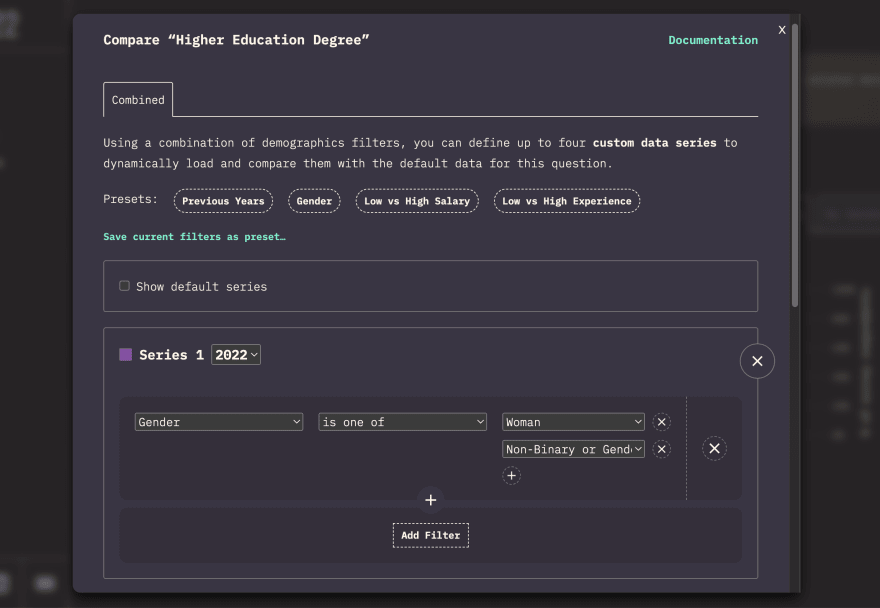
These new filters work on most of the State of JS 2022 charts, as well as on the State of CSS 2022 report. One thing you can do with them is take a chart, and create variations for different subpopulations in order to compare how values differ among them:
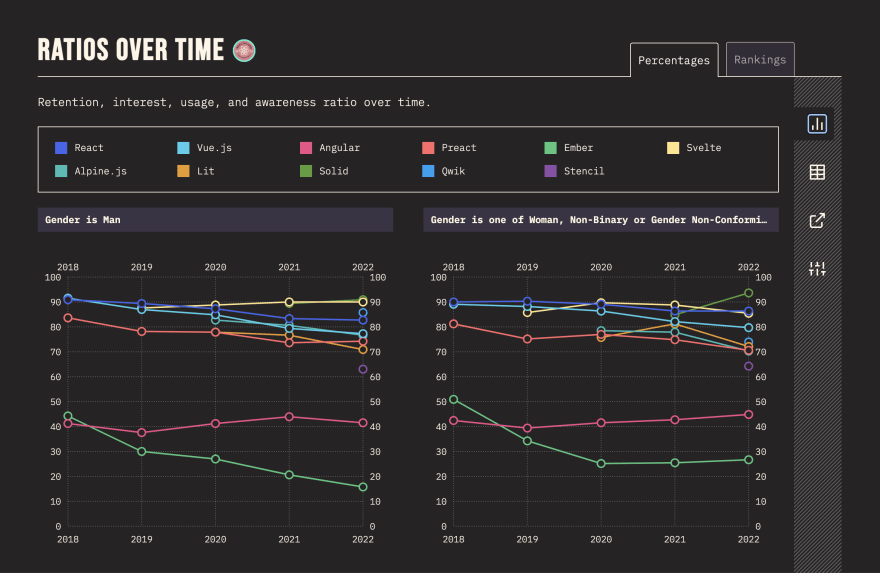
Alternatively, you can take a chart and break down each bar according to a variable such as gender:

You can learn more about these filtering features in our documentation.
An Outlier Appears
You might have noticed the high proportion of women having gone through coding bootcamp as a first step to learning JavaScript in the chart above, and it was while applying that same "faceting" feature to various charts that I stumbled on another outlier:

The e-learning platform Scrimba was apparently doing a much better job of appealing to women than its competitors!
This immediately brought many questions to mind:
- Why were some platforms doing better than others in terms of inclusivity?
- How did other programming-focused communities compare in terms of gender ratio?
- Why was the gender ratio so skewed in the first place?
Why This Article?
When sharing drafts of this article, the most common reaction I got was something along the line of "Why are you doing this? You should focus on improving your own survey's inclusivity instead of looking for excuses elsewhere!"
And I think that's quite understandable. But I want to make it clear that I am not writing this to abdicate responsibility for the survey's own demographics in any way. No matter how generalized the gender imbalance issue may be, I know I still have a duty to try and improve things at my own level.
Moreover, this article itself is actually part of these inclusivity efforts. My hope is that writing about the gender imbalance issue will help me reach the very audience that is currently under-represented in the survey, and if not encourage them to participate in future surveys or, at the very least, make them aware that the survey exists.
With this out of the way, let's get to the data!
Surveys
As I said earlier, from the start the State of JavaScript survey has struggled to attract women respondents.

And even though these numbers are quite bad, it does seem like they are in line with other comparable surveys.
The 2022 Stack Overflow survey reported a 91% ratio of respondents identifying as men) out of 70,853 responses.
And the JetBrains survey found a similar 93% ratio of male respondents.
Things are slightly better over in CSS land, where the 2022 State of CSS survey reported a 88% ratio of respondents identifying as men.

But it's quite possible that all of these surveys share common biases due to their similar methodologies, so I wanted to broaden my research beyond online surveys, which is how I ended up focusing on online education.
Why Educators
Among the users who completed the 2022 State of JS survey, we saw the highest percentage of gender and race diversity in the lower end of the "years of experience" spectrum.
If we can make sure this new generation of developers isn't turned away by entrenched biases, this could prove to be a great opportunity to make the industry more diverse:
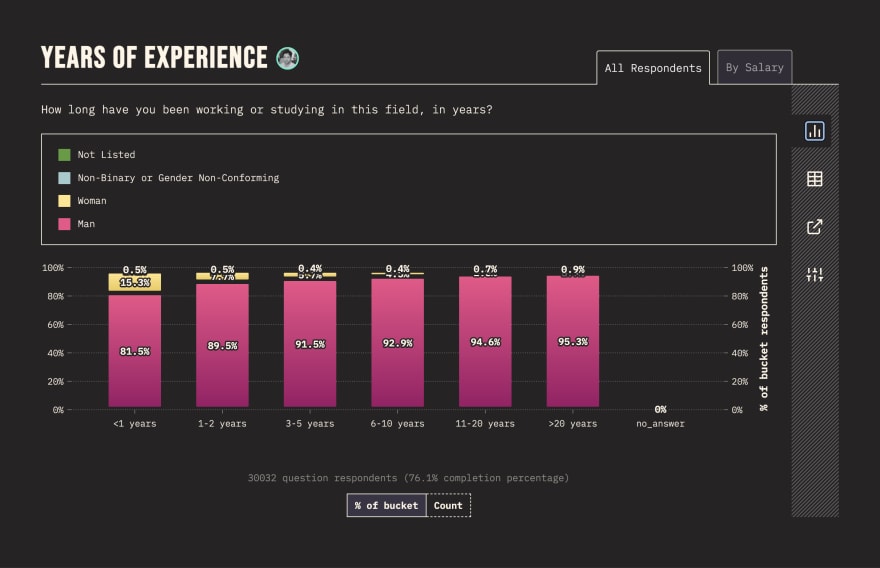
So I decided to focus on educational content in the hopes of highlighting that more diverse segment since this content can often serve as an entryway into the community for people looking to learn JavaScript.
Moreover, today's educational content creators also operate at a larger scale than almost anybody else. Recent surveys have made it obvious just how large an audience YouTubers can command, with Kevin Powell for example being responsible for 10% of all 2022 State of CSS respondents!
And education is also a space that shows a lot of promise in terms of inclusion: many women have managed to create a sizeable following by creating awesome programming content, including Techworld with Nana, CodeBeauty, Mayuko, Coder Coder, Ania Kubow, Tina Huang, and many more.
YouTube
Fireship
With 1.8M subscribers, Fireship is by far the largest coding YouTuber around, with popular videos regularly crossing the 1M mark.
As a reminder, the 2022 edition of the State of JavaScript survey got around 40k respondents. In other words, a single Fireship video can offer an audience sample size 25 times larger than an entire survey!
Sadly, the channel's demographics reveal the same bias as the survey, with a 94% male audience.
But maybe Fireship is an outlier? Let's keep digging to find out!
Web Dev Simplified
Web Dev Simplified has 1.2M subscribers, and their demographics stats confirm the trend with a similarly skewed 91% men ratio:
Jack Herrington
Medium-sized channels are no different. Jack Herrington is a popular YouTuber with over 100k subscribers who covers mostly front-end and web development topics and whose videos routinely get over 50k views.
According to YouTube statistics, his audience is 96% male. From the number alone, you might think Jack spends his videos talking about professional football, beard grooming, Joe Rogan, and other stereotypically male preoccupations. But nothing could be further from the truth.
I asked Jack if he was conscious of this issue, and here's what he had to say:
100% yes, and from the beginning I've made specific content choices to address that.
I use they/them pronouns in regards to all generic role types in an organization, including engineers. I very strongly skew against the "brogrammer" culture (which I despise anyway).
In general I just try to visualize that the viewer is by default a woman.
Jack also informed me he intends to do more collaboration with women on his channel going forward and it'll be interesting to see if that moves the needle.
This is heartwarming since it shows that there are at least some YouTubers putting efforts towards inclusivity, but at the same time the fact that those efforts don't seem to have a strong impact is a bit depressing…
Other Channels
As additional datapoints, Wes Bos revealed that his YouTube audience is 96% male, while Kent C. Dodds has a 93% male ratio.
Coder Coder
You might have noticed that the YouTubers featured so far present as men. So what about creators who identify as women? It turns out that Jess Chan's Coder Coder channel has a much higher ratio of women in its audience, with a comparatively low 83.3% proportion of men:
As Jess points out, this is both due to focusing on introductory content, and a consequence of who they are:
When it comes to creating my coding tutorials, the only factors about my audience that I consider is that they are mostly beginner level, self-taught web developers. I don't cater the content to one or another demographic, I just stick to making educational content.
However, as someone who is visibly different from the majority white, male-presenting creators, I feel like just existing on YouTube is my way of representing minority and marginalized groups. In some anecdotal demographic comparisons, I have significantly more viewers from Asian countries and viewers who identify as female. This is no coincidence, because we will naturally gravitate to people who look like us.
TechWorld With Nana
With 742k subscribers, TechWorld With Nana ranks among the largest programming-focused YouTube channels out there, and popular videos can even cross the 1M views mark.
The channel features demographic stats that are very similar to Coder Coder's, with 86.8% of men in its audience:
At this stage it's hard to say whether the two women-hosted channels' more diverse audiences are the result of gender, a focus on introductory content, or both. But it's certainly interesting to notice such a clear separation with channels hosted by men in terms of demographics.
The YouTube Factor
At this point there's something else that is important to highlight: it's hard to know how much influence YouTube itself is having on these stats.
Although YouTube claims that “>50% of [their] audience is female”, the YouTube algorithm can potentially bias video recommendations (for example, it might have decided not to show programming-related videos to women). Also, we don't really know what logic YouTube uses to determine a viewer's gender.
So while YouTube stats can be interesting (especially since few people proactively track their audience's gender stats otherwise), it's also good to keep these caveats in mind.
Note that one way of getting more reliable data is actually through the surveys themselves. For example, since Fireship used a special ?source=fireship tag when linking to the survey, we are able to segment the sub-group of people who followed that link and filter it by gender, which in this case confirms Fireship's own YouTube stats:

More Women Voices
I want to take a moment to address the scarcity of women voices in this very article. I have reached out to more women creators, and I am hoping to include their data in Part 2.
This is also a good place to talk about the lack of women and non-binary video creators in a recent State of JavaScript 2022 question, which raised some concern about the survey's inclusivity.
This was the first year this new question was introduced, and I completely agree that I didn't put in enough work to ensure that the list was accurate and representative.
This was careless on my part and sent the wrong message to an already-minoritized demographic, and I appreciate those who took the time to rightfully call out this oversight. Going forward I will improve the list, and make an effort to clarify and spell out criteria for inclusion for survey items.
Stay Tuned
Stay tuned for part 2 where I:
- Follow-up with Scrimba to know more about their audience.
- Get data for one of the largest e-learning communities around.
- Talk with an independent teacher and creator about how they their personal brand and voice relates to being inclusive.
- Try to identify which "funnel" is responsible for the lack of women in developer surveys.
- Share my overall takeaways.
Until then, let me know what you think of this whole enterprise by leaving a comment here or pinging me on Mastodon – especially if you've got stats of your own you'd like to add to the set!
Update: Part 2 is now available!
Cover image created using Chromata by Michael Bromley.
Thanks to Jeff Delaney, Kyle Cook, Jack Herrington, Jess Chan, Nicole Hiller, Per Harald Borgen, Wes Bos, Kent C. Dodds, Quincy Larson and Josh Comeau for being willing to share their data and feedback.
And huge thanks to Martin Heidegger, Stephanie Tuerk, Jess Chan, Sameera Kapila, and Sophonie Bazile for reviewing drafts of this posts.


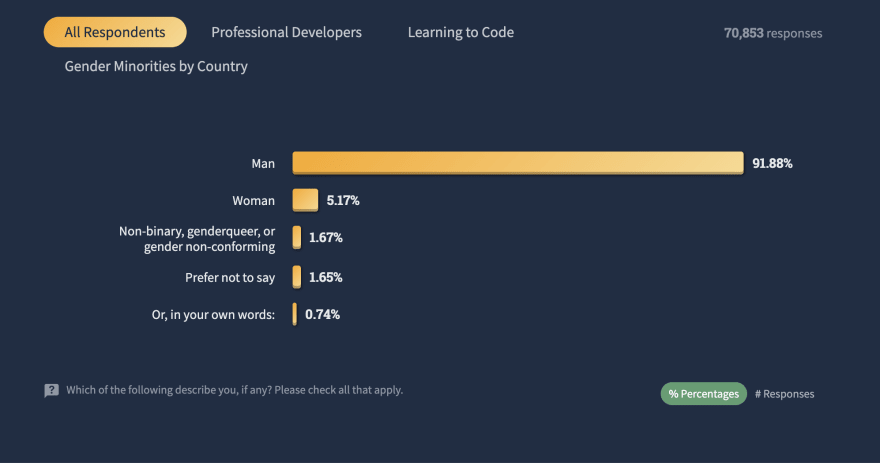



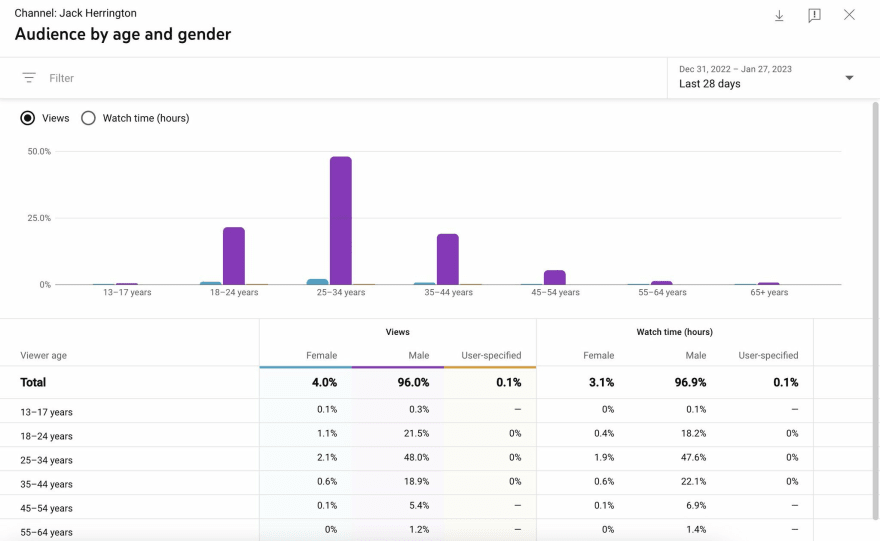
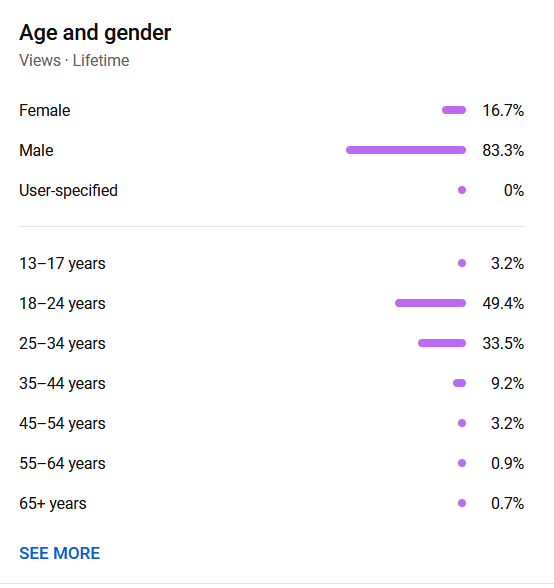
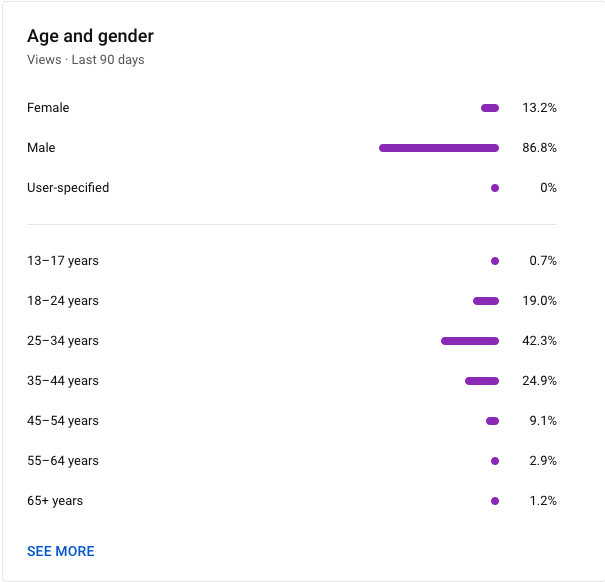





Latest comments (113)
This may be a bit long, but just giving my experience as a woman in the swe industry.
As a woman who's been a swe for over 4 years, I got in as a career transition from academics. There could be a combination of reasons for why there's less women in the swe industry, and I think one part of it is potentially that the field of swe did not seemed to be as inviting, like math wasn't as inviting to me growing up. Most of the guys in my classes were the top performers in maths, and I always thought I'm like Amy Tan and my skill was writing. But later on I found programming and I really enjoyed it. Most of the people I worked with early on was mostly males, and because I play a male dominant sports, I was used to be one of the very few females in a group. But I would say that in terms of mentorship I got a bit of it, but it did feel that during my time getting into the field, it was both a battle of filling in gaps of knowledge, adjusting to corporate culture, adopting a new identity of being a "technical" person, and also trying to push through even though there was little representation of my gender and/or race. But I still haven't given up, and if it weren't for those early years 5-6 years ago when online learning took off, and focus on teaching folks how to learn became a thing, I wouldn't be where I am now. And I hope that more people with empathetic mindsets and technical inclination do step up into the field because it opens the doors of swe industry from what I earlier on perceived as a simply cold calculated field to one where it's about innovation and creativity.
Thanks for sharing this. I like your point about online learning, it's something that has really taken off in the last decade or so and it might take a little bit more time before we see its effects.
I'm sorry, but after your first two points, I just can't take you seriously anymore. Please spend some time reading up on those words you use, because it is painfully obvious you don't have the slightest clue what any of them mean.
The mere suggestion that the "univariate fallacy" may apply to biological sex already presupposes that sex is, in fact, not a binary, but a multi-dimensional space in which we can identify clusters (which is exactly how I have described it on multiple occasions in this comment section).
It is also not a motte and bailey to clearly distinguish sex and gender, and use the right word in each context.
And just to avoid future misconceptions: It is also not an ad-hominem that I am questioning your intelligence. I am not implying you're wrong because you're ignorant, I'm deducing your ignorance from how wrong you are.
Regardless, you have shown, repeatedly, that you lack either the interest, or the capacity, or maybe both for having an honest discussion about an issue that is not up for debate anyway. I won't be answering to any more of your incoherent hateful ramblings. Have a good day (or don't, I can't force you).
I think maybe it is time to do the seven/five whatever whys, because I think the ratio is skewed waaaay earlier. I remember coming from a male only Catholic high school to the computer science uni, all ready to mingle with the other gender, only to realize that the gender ratio was there 1:10 for boys. Surprisingly the corporate workplace softened this ratio and did not make it worse in the places I worked at.
This means we lost the other half of developer population before age 18. So why is that? I still have 0 clue.
What we need here is a huge research, both quantitative and qualitative, including anthropologists, neuroscientists (maybe there is a very interesting cross section with neurodiversity - that's why ADHD and autism is overrepresented in engineering?) and so on, both mostly asking hundreds and hundreds on women, who ventured into software engineering, who stayed, who stopped it or who once considered it but never started learning it to learn:
As I have pointed out, for the purpose of society and law, self-ID is the easiest, most accurate and overall most viable way of defining gender. So no, any other definition is irrelevant and purely a matter of philosophy, which is not a discussion you seem equipped for.
You blatantly deny any progress science is making in this field and pretend none of it exists, as long as it doesn't confirm your dogmatic faith in the binary nature of sex and its 100% overlap with gender. Just because you don't want to understand, doesn't mean the rest of society has to wait for you. Catch up or get left behind.
No and this is a non-issue. Everyone agrees on this. You're just trying to frame your actual point as more reasonable, which is that you disagree whether sex or gender is a better metric in some specific circumstances. But that makes it sound like both sides might have valid points, so you'd rather pretend there's some gender conspiracy that wants to abolish the concept of sex.
Yes. In medical contexts, for example, it is important to distinguish people's biological realities more so than their gender. This does not mean that you shouldn't do so while respecting their identity, though, so going out of ones way to, say, call a trans man a biological woman is still morally wrong, just like calling someone an insignificant sac of meat is biologically correct, but very clearly an attempt at being offensive.
Yes. There is absolutely no ground to stand on to attack this. No people don't believe they're literally cats, no matter how much people insist on this weird fantasy they made up to attack trans people.
In 95% of cases it means she's a woman, end of story. Is there any reason for you to know what's between her legs? No? Then it's none of your business. The burden of proof is on you if you think it is somehow relevant what their chromosomes say.
Yes. That's the point of gendered dressing rooms, in so far that there even is one outside of a heteronormative and sexist idea that women need to be protected from male sexuality and men need to be protected from the temptation of female bodies.
Yes. This isn't as much of a problem as people make it out to be. Actual age will still be real as much as biology is still real despite accepting people's genders. And just the act of identifying as a different age, or hell, even as an attack helicopter doesn't impact you whatsoever. Nobody is going to sue you over not exploding after they made helicopter noises and gestured launching rockets at you.
If gender is entirely subjective, then there is no error rate. If gender is some sort of unmeasurable but real phenomenon in the human mind, then there can be an error rate (and the error rate will not be measurable either, so we'll only ever have a rough idea based on our intuition on individual cases).
Gender is not unrelated from one's sex. They are two distinct but adjacent phenomena. Nobody outside of tumblr is denying this. This also does not conflict with the existence of gender identities not based in biological sex.
The same way you know they're not all plotting to murder you: By acknowledging that you matter way less to people than they themselves and if they're telling you something about themselves it's vastly more likely that it's actually true than an intricate lie to hurt you in some way, specially if that lie isn't even necessary.
Because most people aren't criminals. As for your article, sorry but articles aren't science. And I'm not going to do your work of finding the actual study and reading it only for it to be the 100th time some "data" turns out to either a) contradict the vast majority of other studies or b) turn out to be so fundamentally flawed that only a transphobic cretin could ever take it seriously. This is how you people strategically waste our time.
So anyway, closing statement:
You're wrong, and this sea lion wants its job back.
Colour is binary because there are two, and only two of them:
Wave-lengths can vary. But they are not colour. It isn't dogmatic to insist on this as there is preponderance of scientific evidence to support it.
Gamete sex, which is one I very rarely see brought up in online discussion (maybe shout at all your fellow transwphobes who defend chromosomal sex, because clearly they're more wrong than I am), is not a binary: People can produce big gametes, small gametes, or no gametes. Your video already tries to wiggle itself out of this hard fact by using some vague phrasing like "body plan that produces ... gametes", so clearly they already know that their argument is fallacious. And if you want to follow the line of reasoning of that body plan, well you end up at hormones and chromosomes and your binary just goes out the window entirely.
Again, this is well known. Your position is silly and all arguments for it come down to "but I don't want there to be more genders".
This is, at the end of the day, a matter of linguistics; a field that has long ago formed the consensus that words just mean what people understand them to mean, so "gender" can really be anything.
The dogmatic reluctance to accept any change in definition is almost always politically motivated. An attempt to control discourse by controlling vocabulary, and to lend credibility to the non-existence of a concept by refusing to put a label on it.
It has never been a scientifically sound argument, and shouldn't be dwelt on for too long. It's a red herring.
There's many models for defining gender, really.
I like the simplicity of self-identification; and it's probably the most viable on a societal level, as it is by far the easiest to evaluate and has so far proven to have an incredibly small error rate (No, there isn't any noticeable number of people "pretending" to be another gender, that's just not a thing).
But that isn't to say we can't form more specific models of what gender ultimately is, at its core. That's just not the same discussion, because we can't look into people's heads and transcribe what we see onto their ID cards. We also can't look into people's heads to figure out their "biological" pronouns.
So the whole "someone who identifies as x" is really just the practical side of it. It's a rule of thumb to guide our behaviours, based on the idea that other people are both sentient and reasonable, and can probably be trusted to tell us who they are. We can' give better explanations of what gender is. Those are just not practical in everday life.
It's very telling how you're entirely dismissing any possible violence (including sexual assault) between men in prison. This isn't about violence in prison, this is about hating and demonising trans people.
I'm not going to read all of that word salad, and I'm not going to attempt to fix your arrogance. You clearly think you're smarter than all the experts in many fields of science, ranging from biology to linguistics, and without even understanding the foundations of the current consensus in any of those fields. You're beyond help.
It's funny because I've probably had this user-name for longer than you've been allowed on the internet. And I'm not just talking about your 1-day-old sockpuppet account with a suspiciously similar naming scheme to the other 1-day-old sockpuppet account in the conversation.
Either way, setting your ad-hom cope aside, a strict binary of biological sex has no basis in reality and none of the "arguments" for it are even consistent, nor conclude in an actual binary.
Chromosomal sex isn't a binary.
Gamete types aren't a binary.
Genitalia aren't a binary.
Secondary characteristics aren't a binary.
Gender isn't a binary.
And worst of all, none of these necessarily align and if you bundle them all up you just end up with more and more degrees of freedom that allow for countless permutations. At that point, best you can do is to identify clusters of data-points. Gender isn't a binary.
Yet you insist that sex is a binary against all evidence. That is dogma.
I see you're more interested in asserting your dogma than finding the truth, so I see no reason to continue this discussion
But why would the natural conclusion of all this be "we need separate prisons for biological men and women"?
If there are opportunities for sexual assault because inmates do not have their own individual safe spaces and have to share a room for example, isn't that the actual problem we should address, i.e. prison overcrowding? Men can sexually assault each other, and so can women. Can you see why the fact that you specifically chose to stigmatize trans women for it can come across as bigoted?
I think the new meaning of "x" is "someone who identifies as x". It might be a circular definition, but so are most words if you think about it. The meaning of "red" is "something that has the color red" and everyone seems just fine with that.
But the issue about having a debate about all this on a purely semantic level is that it's not a morally neutral debate. Doing that ignores the experience of actual human beings who are being hurt by these very semantics.
So I feel like even if you personally feel like this doesn't conform to your own sense of what is or isn't "observable material reality", the impulse to be kind to other humans should be enough to make you overlook that somewhat minor inconvenience.
Even if you were right that up until recently "gender" was commonly understood to be the same thing as "biological sex", why can't that change?
In a way it's lucky that we happen to already have two existing terms. So instead of having them overlap in meaning just reassign gender to the "new" meaning! Plus you don't even need any surgery for that particular gender reassignment, just a little bit of open-mindedness :)
That's not true though. It's more accurate to say sex is bi-modal. There is two clear clusters that we can identify as biologically male and female, but there is many outliers and even within the clusters there is no absolute uniformity. And that's without even considering that gender might itself have a strong biological component, in which it could be perceived as one of many sex characteristics, further undermining the idea of a sex binary.
Either way, sex is entirely irrelevant to this discussion, as the survey didn't even ask about it. The data we have is about gender so that's what we're discussing.
It's called reality. Calling it an ideology won't make the truth go away.
That's, to put it simply, not true. Just because Western countries have built their laws and systems off of the idea that the nuclear family is the main economic unit for their society does NOT mean that other genders have never existed - they have, and STILL, exist, and they will always continue to exist long past the demise of Western society.
I always find it exhausting when people like you refuse to open up their imagination to the slightest possibility of people being remotely different from what you're used to. Maybe just grow up!
Thank you for taking the time to do an in-depth analysis of the gender ratio of your surveys. I've been taking the surveys for about five years now, and every year I am painfully disappointed by the ratios, but not surprised given that the ratio accurately reflects my current working environment (sigh, AWS).
In regards to the YouTubers in particular, the sample size of me and a few of my past female colleagues says that we don't generally gravitate towards video content. For me personally, I just don't have time to watch anything during the workday, and if I want to learn something new, I'll choose the blog post with coding examples I can copy/paste and try out over any other medium. It's the same for podcasts - I can't just listen to something about JavaScript to learn, I need to have my VS Code open while I'm absorbing new information so I can put it to use and solidify the knowledge.
I'll confess that I don't really watch coding YouTubers either, even though a lot of them put out great content, probably just for lack of time.
But anecdotally, looking at the State of JS data, while some video creators have low women ratios, others have about the same 5% ratio as the survey overall – possibly indicating that it boils down more to individual YouTuber style more than a gender-based video-watcher vs non-video-watcher divide?
For sure! I guess my aim in pointing that out would be to encourage looking into the gender ratios of other mediums, like those who follow tech bloggers or documentation, to get a more holistic picture.
I've got a mail from you where you state that dev communities is suffering from gender imbalance
"Read the article to find out if Fireship, freeCodeCamp, Scrimba, and more, also suffer from the same kind of gender imbalance"
Can you explain me how do they suffer? Whats so bad?
If we see it from a purely scientific point of view, it makes the survey data harder to exploit for researchers or library makers and companies that care about the survey results.
In this case "suffer" should be understood as "is affected by". But taking your question literally, I think my chat with Jack Herrington showed that he's quite disheartened by the poor gender diversity of his own audience – so yes you might say that he does "suffer" on some level (and obviously the people who don't feel represented in the industry suffer too, but that goes without saying).
At which % of women in the respondents can we consider that the results of the survey are representative of the reality of the community? I'm curious about how strong the skew is in the results, to know how much to adjust for it. For example, dataprot.net/statistics/women-in-t... doesn't send a clear picture.
At the moment, I am thinking of it like so:
Someone mentioned in another comment that the ratio is somewhere around 3:1, so that would be the goal for the poll to be representative. Of course, even then there's still the question of why the industry as a whole is that skewed in the first place, so it's not like work ends there.
I appreciate this "My hope is that writing about the gender imbalance issue will help me reach the very audience that is currently under-represented in the survey". That's a good idea and point. Although I believe that you shouldn't need to apologize for collecting data? In which ways this survey was closed to diverse genders? This is literally data, you asked a question and 93% of responders were men, and that's about it. You could ask why that's the case and draw an hypothesis but that's about it (which I think it's the point of your article). It'll take time until other genders/races/etc join the field (if they want/can to of course). I get the feel that we're trying to force our will on reality, maybe they'll never be balance gender representation across fields, maybe there will.
I'd argue that, when making a survey like this, which some might take as a measurement of the opinions within the community, one has a certain responsibility to at least try getting representative results. So it's not like "it's just data" is a perfect excuse. At the end of the day, producing skewed data means producing bad data, and if that data fails to represent some situation because of a lack of quality, then that can lead to worse outcomes for people.
So while I agree that not reaching enough women isn't an irredeemable sin, it is worth addressing and trying to fix.
Two points I've mentioend elsewhere:
This isn't about how many women are in tech, it's about women being under-represented in the study even relative to their representation in the industry overall, so that's a data problem more than a social problem.
The problem isn't so much that the industry somehow needs a 1:1 ratio of men to women to function. It probably wouldn't matter much if it was 100% men or 100% women, if that just happened naturally. The point is that there's no reason to believe the current under-representation of women is just a thing that happens on its own, so it's reasonable to assume that something is artificially upholding this skewed gender ratio and that's where the problem is. Getting more data from women in surveys like this might also be a piece to that puzzle.
Great point! I think many people miss that. I also think that even if a profession hypothetically had a more reasonable 60/40 balance, there is always a risk of the majority (however slight) imposing its own norms and culture, which in the future might turn away people belonging to the minority from joining it, and keep making that imbalance more and more acute.
Obviously that's not always true otherwise every profession would end up being just as heavily gendered as programming is, but I do think it's worth keeping in mind that these imbalances are often self-perpetuating.
This isn't a revolutionarily new idea, but I'm sure this exact mechanism is how many forms of segregation come to be; by feedback loops that re-enforce very tiny differences (even differences that aren't even relevant anymore).
My take on why programming suffers so much from this is that it just has some qualities, inherent or not, that make it very susceptible for this type of feedback loop. Maybe it's the strong focus on mentorship that seems to exist in some parts of the field, maybe it's the constantly changing environment that favours people with connections who can predict what technology they should learn. Either way, it's not like programming is the only field with this problem and there's others where the gender imbalance goes the other way, so it's not like this is mysteriously only affecting our field alone.
I'm curious to know where this fact comes from "it's about women being under-represented in the study even relative to their representation in the industry overall"
It's a bit hard to assert this as a fact because there is no definition of what "the industry" even is, especially on a worldwide level. So maybe a better way to phrase this would be that there are clearly sub-communities of "the industry" that have a better gender balance, and we would like the State of JS audience to become one of them.
Right, that make sense. I think that was the assumption I was trying to point out. We think that the "community" (whatever that means) has a certain shape that we're trying to reflect... but the data is showing a different thing to what we would want or expect. I would personally love to see more diversity and I try to do my share but I also wouldn't want to become blind to facts
Some comments may only be visible to logged-in visitors. Sign in to view all comments.